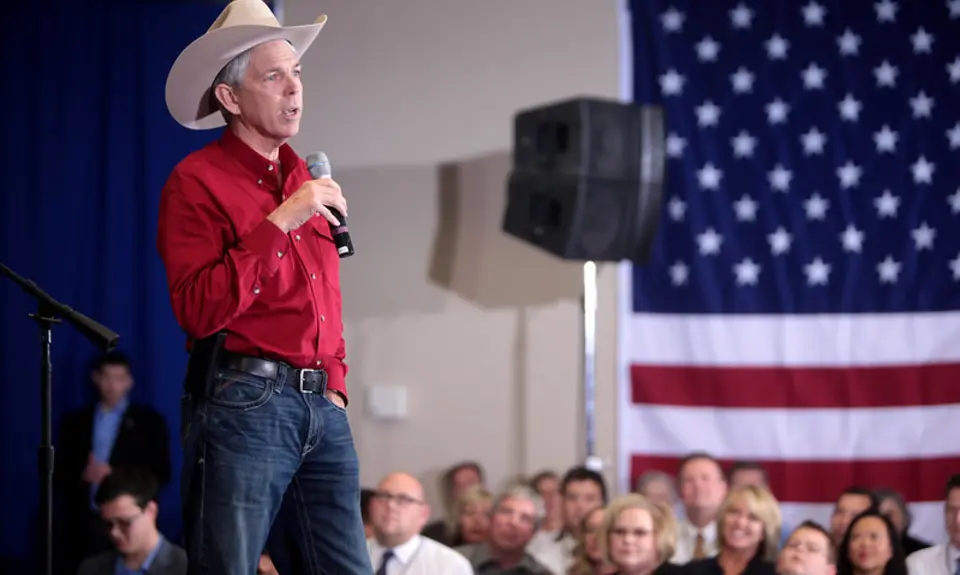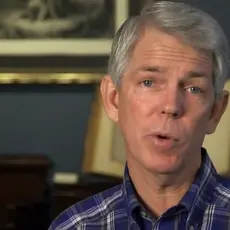The Christian nationalist pseudo-historians at WallBuilders dedicated Monday's episode of their "WallBuilders Live" radio program to dismissing concerns about Christian nationalism. They did so by intentionally misrepresenting what Christian nationalism actually is, with David Barton, who is in many ways the intellectual father of the modern Christian nationalist ideology, creating a definition that was so broad as to be practically meaningless.
"They say that if you believe that there is a difference between men's and women's sports, you're a Christian nationalist," Barton claimed. "If you think that Roe v. Wade should be overturned, you're Christian nationalist. If you believe that you should place constitutionalists on the Supreme Court rather than social activists, you're a Christian nationalist. If you believe that there should be a border wall, you're a Christian nationalist. If you believe in enacting tax cuts, they say that's a characteristic of Christian nationalists is they want tax cuts. If you want to reduce welfare spending ... Here's what they said that Christian nationalists oppose: They oppose critical race theory, they oppose pornographic books in schools, they oppose embryonic stem cell research, they oppose gun control. This sounds like most Americans."
While these are certainly things that Christian nationalists believe, believing them does not necessarily make one a Christian nationalist, and that is because Christian nationalism is less about what sorts of specific policies one supports than about how one views the role of Christians in society and government.
There are countless articles explaining just what Christian nationalism is, but perhaps the most succinct definition was provided by professor Bradley Onishi, author of "Preparing for War: The Extremist History of White Christian Nationalism--and What Comes Next," during an appearance on NPR's "Fresh Air' earlier this year. During the broadcast, Onishi explained that what sets Christian nationalists apart is their belief that they are entitled to occupy a position of privilege from which they can ensure that their agenda dominates government and society:
I think in very simple terms, Christian nationalism is the idea that Christian people should be privileged in the United States in some way - economically, socially, politically - and that that influence and that privilege is a result of the country being founded by and for Christians. Christian nationalism is not the idea that others can't be here - that if you're a Muslim or an atheist, that you have to leave. It's also not the idea that only Christians can be part of the government. However, for most Christian nationalists, there is a core belief that the story of the United States is one where it has been elected by God to play an exceptional role in human history, and as being chosen by God, it's the duty of Christian people to carry out his will on Earth.
So Christian nationalists take an approach to their Christianity that says it should have an undue influence on our government, on our economics, on our culture, and that it is by dint of our history, the religious faith that is meant to be privileged in our public square. With that said, there are different kinds of Christian nationalists and different ways that people manifest their understanding of the term. But when it comes down to it, if we all sit down as Americans at a table and there are people from different backgrounds, different ethnicities, different faiths, and someone who is a Christian says, just by being at this table, I should have a special place, well, to me, that's Christian nationalism because you're saying that somehow this country is yours in a way that it is not for everyone else. And to me, therein lies the problem.
This is the standard understanding of Christian nationalism and even Christian nationalists are open and unapologetic about promoting it.
In fact, professor Mark David Hall, who was the guest on this episode of "WallBuilders Live" to promote his latest book "Who’s Afraid of Christian Nationalism?: Why Christian Nationalism is Not an Existential Threat to America or the Church," laid out the same definition.
"What I do in my book is I come up with a definition of Christian nationalism that I think is reasonable," Hall said. "A Christian nationalist is someone who believes that America was founded as a Christian nation, and who believes that Christianity should be favored by the government above other religions, so that Congress should declare formally declare America to be a Christian country, that public schools should have teachers leading children in Christian public prayers."
"If you think about it, this kind of returns America to where we were in the 1950s, minus the racism, minus Jim Crow legislation, minus the sexism," he continued. "I think about 20 percent of Americans would be perfectly happy to ban Drag Queen Story Hours, and formally recognize God as we did in the 1950s on our money and in the Pledge of Allegiance."
Hall then added that "there are good biblical, theological, prudential and constitutional reasons for rejecting even that manifestation of Christian nationalism," which is a remarkable thing to say on "WallBuilders Live," as all of the things he laid out are exactly what Barton and his ilk want to see.
Barton has spent his entire career working to convince people that America was founded as a Christian nation and that Christianity should be favored by the government over other religions. He has repeatedly declared that prayer and the Bible should be taught in school and encouraged teachers to use their positions to inculcate Christianity in their students. Barton has even insisted that “religious folks” like him are entitled to “more protection” under the First Amendment than everyone else.
David Barton and his WallBuilders organization represent the very definition of Christian nationalism that Hall says there are myriad reasons for rejecting, yet Barton and WallBuilders nonetheless insist that there is no cause for concern about Christian nationalism because it's nothing more than a fictional left-wing boogeyman.
| Every day, Right Wing Watch exposes extremism to help the public, activists, and journalists understand the strategies and tactics of anti-democratic forces—and respond to an increasingly aggressive and authoritarian far-right movement. The threat is growing, but our resources are not. Any size contribution will help us continue our work and become more effective at disrupting the ideologies, people, and organizations that threaten our freedom and democracy. Please make an investment in Right Wing Watch’s defense of the values we share. |






